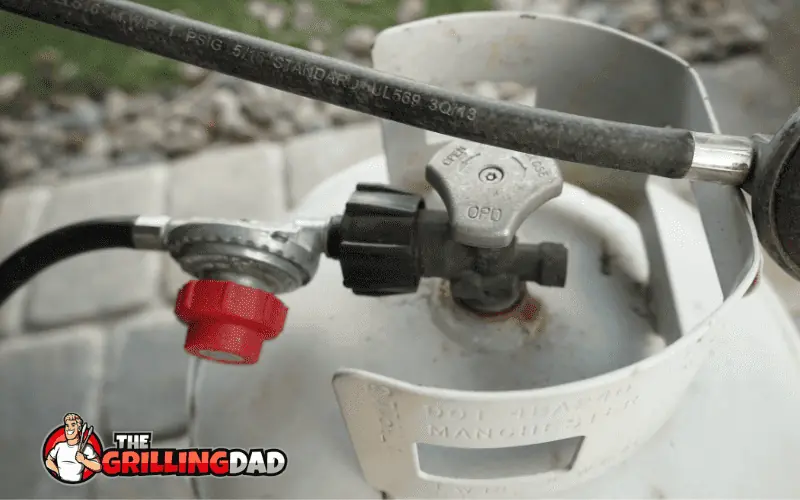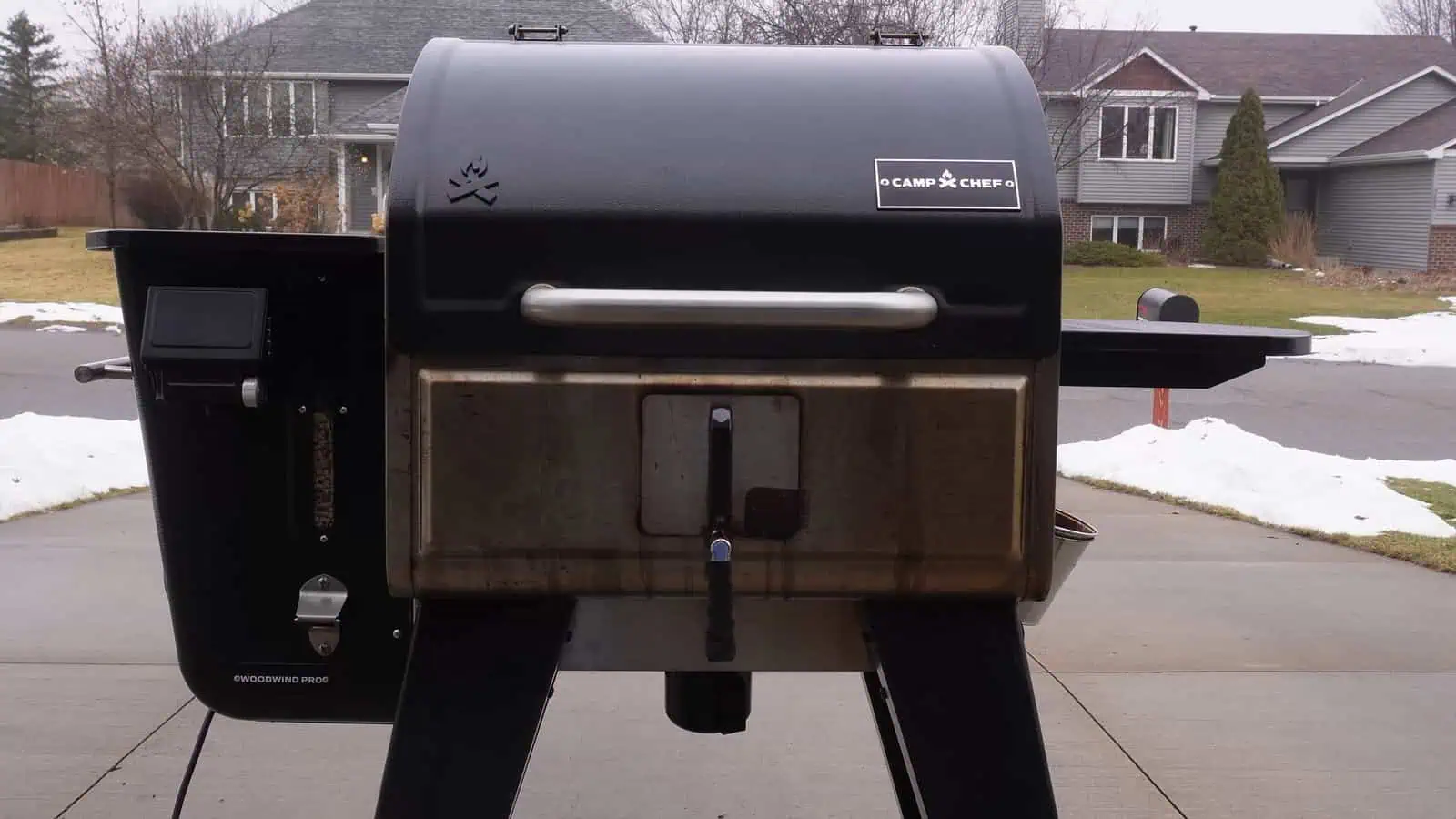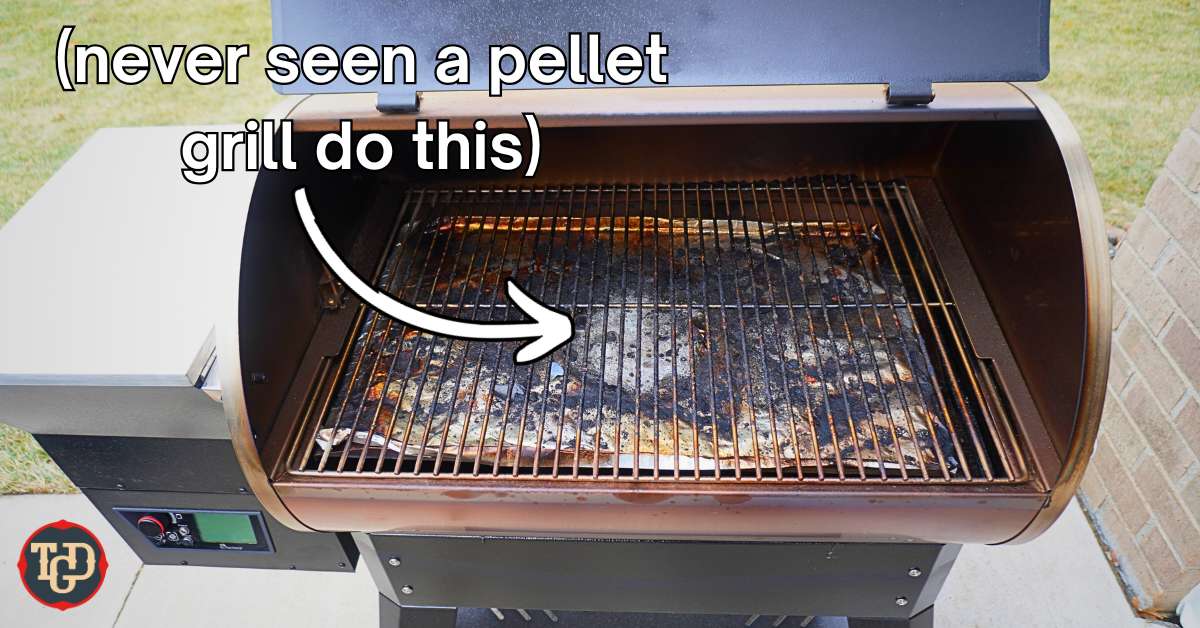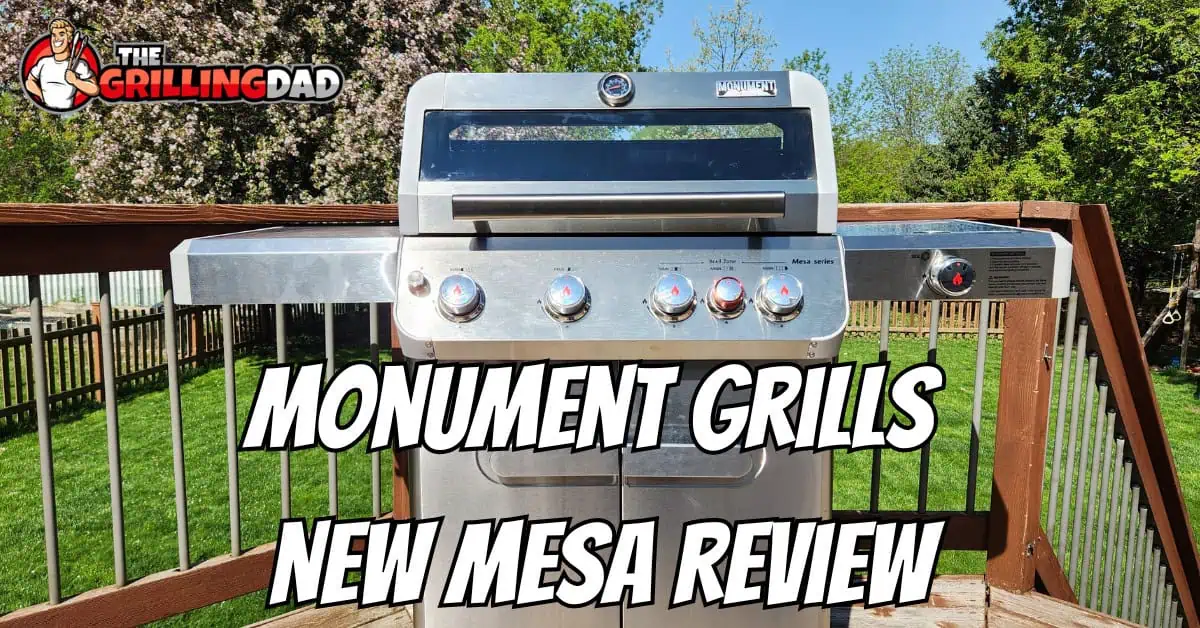If your propane tank is leaking, we’re here to help you learn how to fix it.
In this TheGrillingDad.com guide, you’ll learn:
- How to fix a leaking propane tank
- How to prevent it from happening again
- Safety tips
- And much more!
A leaky propane tank can spell trouble, from the breathing in of harmful gas, to a potential explosion and fire.
This doesn’t necessarily mean that you need to replace it! In fact, there are a couple of tests that you can do to determine where the leak is and how serious it is.
Correct propane tank maintenance is incredibly important!
If in doubt, call emergency services.
Keep reading below for in-depth, step-by-step instructions on how to diagnose problems with your propane tank and the correct safety precautions that you need to take!
Jump to Section
How to Stop a Propane Tank From Leaking
Most incidents using propane can be avoided, and knowing what to do and doing it quickly will save lives in the case of an emergency,
Sometimes it’s simply a matter of tightening the screw or valve if it is loose, but you need to make sure that your surroundings are safe to do so.
Take the following safety steps:
Get Rid of All Potential Igniters
It is absolutely vital that you remove any potential igniters from the area.
Propane is highly flammable and can explode. Even if you’re not sure whether the propane tank is leaking, you should treat it as though it is.
This is not the time to be using your mobile phone to learn how to fix a propane leak, because the phone itself is a potential igniter!
In fact, if you suspect a leak, you should stop whatever you are doing and check the immediate surroundings for any potential igniters.
The following list is a starting point, but you will need to consider everything around you:
- Open flames: Make sure that there are no open flames, and do not flick any cigarette lighters.
- Household lights: Turn your lights off.
- Appliances: Unplug them and turn them off.
- Mobile phone: Remove from the scene.
Open Your Windows
If you suspect a gas leak indoors, open the windows immediately.
Opening the windows allows for air to circulate around the area, so that any gasses released from the tank are less concentrated.
It’s important to ventilate the area so you’re not breathing in any harmful fumes. If the odor is particularly strong, call emergency services.
Find Where the Leak is Coming From
Stir a cup of dishwashing liquid into a cup of warm water and pour into a spray bottle. Then simply spray around the gauges and valves of the propane tank.
Turn Off the Main Gas Supply Valve
Turning off the main gas supply valve is easy to do, and it’s important to do so before taking any further steps.
Simply find the main gas supply valve- usually located under the tank cap- and turn it clockwise to turn it off.
Slowly Open the Cylinder Valve
After this, slowly open the cylinder valve so that a little gas comes out. If you have sprayed it with soap solution, you will see bubbles at the site of the leak.
You can work out how big the leak is from the intensity and size of the bubbles.
Tighten the Screws and Valve
This may stop the leak if the screws and valve were simply loose before, but you need to carry out the following procedure to check.
Turn off the cylinder valve to stop the leak, then use a screwdriver to tighten the screws on the gauge.
If necessary, tighten the valve by turning it clockwise.
Find Out if the Tank Still Leaks
After about 15 minutes, spray the solution again on the areas that were leaking before. Slowly turn the cylinder valve to check if there is still a leak.
If bubbles resurface, then that means there is a leak present.
Stop Trying to Repair the Propane Tank
Once bubbles appear on the tank, stop all attempts to repair it.
If your tank is still leaking you are in danger, and need to evacuate the area. It’s important to wait until you are clear of the area and the leak before using a cellphone.
Evacuate and Call For Help
At this point, you need to leave the area and take anyone nearby with you.
Once you’re at a safe distance from the leak, call emergency services.
Stay away until an authorized professional tells you it is safe to return.
Related >> Best Gas Grills Under $500

How to Determine a Leaking Propane Tank
There are several ways that you can check if there is a propane leak. If there is a leak, one of these methods below will usually reveal it.
Strong Sulfuric Odor
This is quite a reliable method for checking if your propane tank has a leak.
Propane tanks come with added foul-smelling odorants to alert you to any leaks. These are not all made alike!
Some manufacturers will add something that smells like rotten eggs or dead animal matter.
There shouldn’t be any doubt as to whether the smell is bad or not- because it really will be awful!
Faint Hisses
If the leak is so loud that you can hear it clearly, this is more serious. It indicates a big leak and accordingly requires greater immediate action.
Soap Water Method
You can determine where the leak is coming by using this method.
Stir a cup of dishwashing liquid into a cup of warm water and pour into a spray bottle. Then, simply spray around the gauges and valves of the propane tank.
If you see bubbles, that’s a clear sign that there’s a leak!
Use a Leak Detector
Alternatively, you can use a leak detector instead of dishwashing liquid and water.
Leak detectors are a quick and reliable way to check if your propane tank is leaking.
They work by monitoring the gas concentration in the air, and will emit an alarm if there is a leak detected.
Related >> Top 5 Best Propane Smokers
How to Avoid Issues with Your Propane
Prevention is always better than the cure, so it’s best to practice safe storage and prevention methods with your propane tank.
Here are some ways in which you can do so:
Keep it Outside
All it takes is one spark to ignite gas released during a propane leak. Most garages have extremely ignitable contents such as cars, power tools, and lawnmowers.
Keep it in the Shade
Because the propane is flammable, you need to make sure that the tank itself does not get too hot, otherwise pressure will build up.
As the tanks have a valve to detect internal spikes in pressure and release gas accordingly, any gas that is released could ignite.
Practice Proper Storage
Keep the tank 10 feet away from other tanks, the grill or BBQ itself, and any other potential igniter.
Related >> How to Hook Up A Propane Tank to Your Grill
Keep it Upright
Make sure you keep your propane tank upright! If your tank is tilted, gas can leak from the top valve.
Your propane tank may also be equipped with a safety valve, which may clog if stored incorrectly or lying down.
You may accidentally damage the valve at the top of the tank also, which can lead to leaks.
Keep the Valve Closed
When you are not using the tank, close the valve tightly. There is a protocol for doing this.
First, shut off the valve. Then, only after you’ve done that, turn off the burners so that any gas that has accumulated is cleared.
Don’t Use a Damaged Tank
This includes any damage or rust. Be careful when you are moving the tanks as well!
When you are bringing them home in a vehicle, stand them upright in crates.
Do not use a propane tank that is rusty, because rust can make it difficult to detect the odorant.
Related >> Pellet Smoker vs Propane Smoker
Frequently Asked Questions
Do Propane Tanks Leak Over Time?
Propane tanks shouldn’t leak over time, but they can get leaks upon refilling if they run out of gas and the valve or gas line has been left open.
Care should also be taken not to overfill the tank.
What are Some Ways to Turn On a Propane Tank Safely?
Look for the “open” arrow that tells you which way to turn the valve, then simply turn it with a clean cloth (this will usually be anticlockwise).
Keep twisting the valve until it stops moving, and do not force it further.
How do you Fix a Leaking Propane Tank Valve?
The above guidelines show you how to check for leaks. Sometimes the valve itself needs changing.
To replace a valve, you need to open it to let the gas out. Then, close it once it is empty.
Next, heat the weld with a heat gun to soften the gas valve and cylinder connection. Open the tank nozzle to bring the tank regulator to atmospheric pressure.
When the weld is soft enough, turn the old valve clockwise with a pipe wrench to take it off.
Finally, attach the new valve onto the cylinder and tighten it with the pipe wrench.
How do I Protect my Propane Tank?
To protect your propane tank, you should keep it outside in the shade, and away from other tanks and potential igniters.
The tank should be kept upright with the valve closed. When transporting it, care should be taken not to knock or dent the tank.
Related >> How to Remove a Propane Tank From a Grill
Final Thoughts on Leaky Propane Tanks
Propane tanks are useful and convenient, and are commonly used in outdoor cooking and grilling.
However, due to the ignitability of the propane gas, they can also be a hazard!
This is not to say that you should not use them, but that you should follow stringent safety guidelines and look after them properly.
By checking regularly for leaks and storing your tanks properly, you can extend the life of your propane tank and reduce risks to health and safety.
If you discover a problem, it is best to call for help when needed!






I have a couple of grills and I notice that I have propane leaks when the weather turns cold. Even if unscrew it and reattach it I still get a leak. But once it warms up outside I no longer have leaks. Is this just a property of propane under cold conditions or should I be experiencing this?
That’s weird. Propane does behave differently in the cold. But I’m not sure that means it should leak!
Do seals on leased “Exchange” tanks go bad? More often I’m having leaks at grill to tank connection. I have found bad seals on leased tanks. I return them, more of a problem as of late. My equipment looks good, no damage. Yet, Tank to grill leaks. Any thoughts? Chris
Chris – I haven’t ever really encountered that problem. I know you can buy gas-rated Teflon tape that may help resolve these issues. The other alternative is to purchase a tank and find a local gas station or propane dealer who can refill it for you. I hope this helps!